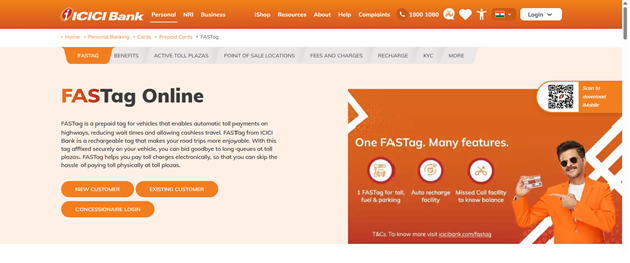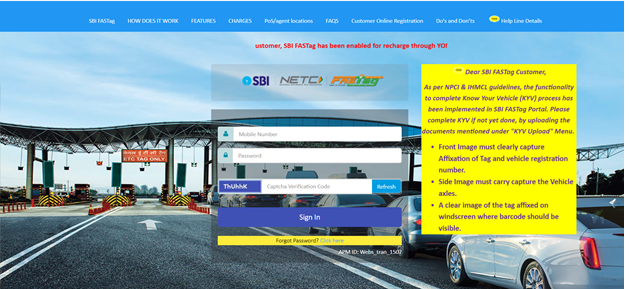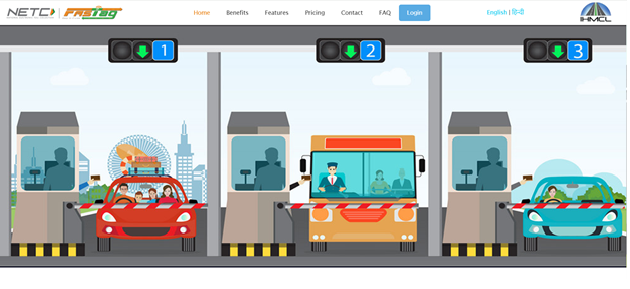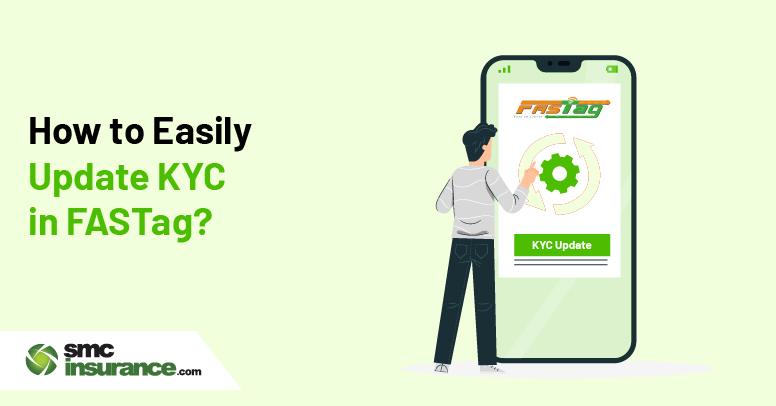How to Update Your FASTag KYC:
- → Go to your FASTag issuer's website or app (e.g., ICICI, HDFC, Paytm, IHMCL).
- → Log in using your registered mobile number and OTP.
- → Visit the 'KYC' or 'My Profile' area.
- → Upload relevant documents, including Aadhaar, PAN, RC, and a photo, if applicable (Corporate users may require supplementary documentation).
- → Submit your data for verification.
- → Wait 1-3 business days for approval.
- → You will be contacted after KYC has been properly updated.
Ravi had his chai in one hand and car keys in the other. “Just a quick drive to Grandma’s,” he smiled, waving to his wife. Engine on, seatbelt clicked, he pulled out of the driveway, singing his favorite old Bollywood song. But at the toll booth, BEEP! Payment failed.
“What? FASTag’s not working?” he muttered, confused. A line of cars behind him started honking. The toll guy leaned in, “Sir, KYC update pending. You need to fix it online.” Ravi scratched his head. “KYC? What? Now how long is that going to take?”
Sounds familiar? We’ve all had a Ravi moment, caught off guard by something that should’ve been simple. Updating FASTag KYC isn’t hard, but knowing how to do it without getting confused? That’s where most of us get stuck. So, how do you fix it quickly before your next road trip turns into a roadblock?
Let’s walk through it. Know more in the article below.
What is FASTag KYC and Why Is It Important?
Every car owner in India needs to have a FASTag in this fast-paced world of digital toll fees. But there is one crucial step you cannot omit: "FASTag KYC" to guarantee seamless and continuous service.
So, what is FASTag KYC exactly?
"Know Your Customer" (KYC) is a verification process mandated by the National Highways Authority of India (NHAI) to confirm users' identities for FASTag services. To get a FASTag, you need to provide valid papers like your Aadhaar card, PAN card, and vehicle registration certificate (RC) to the bank or platform that issued your tag. It is no longer possible to change your KYC in FASTag, regardless of whether you obtained your tag from HDFC, ICICI, SBI, IDFC, or another supplier.
But why does it matter so much?
Due to growing concerns about regulatory compliance, misuse, and duplicate tags, the National Highways Authority of India (NHAI) has mandated FASTag KYC. FASTags with incomplete KYC may be deactivated, even if they have sufficient balance, leading to potential toll payment issues. Also, each tag needs to be properly linked to a single vehicle with appropriate KYC under the new "One Vehicle, One FASTag" concept.
Still unsure about how to update FASTag's KYC? It's simple, quick, and even possible to complete online, so don't worry. Through their websites or mobile apps, a large number of banks and platforms provide online solutions for FASTag KYC updates. In certain situations, you can even perform a video KYC, or v-KYC.
Not only are you abiding by the law, but you're also simplifying your road journeys by confirming your identification and making sure your tag is completely legal.
Key Benefits of Completing FASTag KYC
Not only does updating your FASTag KYC fulfil a legal need, but it also opens up a number of benefits that improve the efficiency, security, and smoothness of your trip.
Here are some reasons to update your KYC right away:
- Prevent Service Disruption and Deactivation
Even after topping it up, a FASTag with improper KYC may be ceased or blocked. You can ensure continuous use by completing your FASTag KYC, particularly while driving on highways.
- Increased Recharge and Usage Limits
Your monthly transaction and load limitations are limited to Rs. 10,000 if your FASTag is still subject to minimum KYC requirements. That restriction is removed with full KYC, allowing you to keep up to Rs. 2 lakh in balance. Those who own commercial vehicles or travel frequently will find this very useful.
- Avoiding Fraud and Misuse
Because an approved FASTag is associated with a single vehicle and a verified user, the likelihood of fraud or misuse is greatly reduced. This improves general security and aids the government's "One Vehicle, One FASTag" policy.
- Having Access to Improved Features
Only full KYC users can access premium features including real-time toll updates, expedited processing, and fuel payment integration from many banks and platforms. You can access these added benefits after completing your KYC.
- Easy Online KYC Options
It's now easier than ever to update your FASTag KYC online with the use of user-friendly apps and portals from banks like ICICI, HDFC, SBI, IDFC, etc. Some even allow video KYC, which removes the need for branch visits.
To put it briefly, a FASTag KYC update is a ticket to a more seamless, savvy, and stress-free driving experience. Before the toll booth reminds you, do your KYC today and drive without any worries.
What Are the New FASTag Regulations?
No more waiting in long lines or fumbling for change as FASTag has already changed how we travel on Indian highways. However, more restrictive regulations are now required to streamline usage and prevent misuse as a result of widespread acceptance. With the most recent FASTag guidelines, the National Highways Authority of India (NHAI) is striving for precisely that.
So, what has changed? Let's have a look at it.
"One Car, One FASTag Rule"
The days of having many FASTags associated with a single car or using a single FASTag for multiple vehicles are long gone. Every vehicle must have a single FASTag, and every FASTag must be correctly linked to a single vehicle under the new "One Vehicle, One FASTag" concept.
The purpose of this action is to stop misuse, prevent the use of duplicate tags, and ensure more efficient toll collection nationwide. It's time to deactivate any other FASTags you may have for the same vehicle and keep only the one with the most recent KYC.
KYC Is Now Mandatory
According to the most recent RBI recommendations, FASTag KYC is now compulsory. Even if your FASTag has enough amount, it may be blocked if your KYC information is out-of-date or missing.
You must present legitimate documentation, including your PAN card, Aadhaar, and vehicle registration certificate, regardless of whether your tag is from ICICI, SBI, HDFC, IDFC, or another issuer. And because of digital solutions, you may update your FASTag KYC online or, depending on your supplier, even by a video KYC process.
Deadlines You Must Meet
A deadline for completing KYC and implementing the new policy was first established by the NHAI, but because of user misunderstanding and delays, it was moved to February 29, 2024. Later, the "One Vehicle, One FASTag" rule was extended until March 31, 2024.
But don't wait for the next reminder of the deadline. By updating your KYC now, you may prevent last-minute stress and assure uninterrupted service.
Implications of Non-Compliance
Are you still considering ignoring the update? Rethink your thoughts. If you have not finished your FASTag KYC:
- They might disable your tag.
- You can run into problems when crossing toll plazas.
- As a punishment for noncompliance, you may even be required to pay double the toll cost.
Note: As of February 1, 2026, the requirement for FASTag KYC verification has been removed. Banks are now responsible for verifying vehicle details at the time of FASTag issuance.
How to Update KYC in FASTag Online: Step-by-Step Guide
Since NHAI and RBI recently made FASTag KYC necessary, millions of users are now rushing to make revisions to their profiles. The good news? Unless you prefer offline mode, updating your KYC online is simple and requires no paperwork, confusion, or queues.
We've made a concise and easy-to-follow guidance to help you finish the KYC procedure in a matter of minutes, regardless of whether your FASTag is from Axis Bank, ICICI, HDFC, SBI, Amazon Pay, or Paytm.
- Update KYC in Axis Bank FASTag
To update your KYC with Axis Bank FASTag, take the following actions:
-
- Check out the official Axis Bank FASTag website.

-
- Enter your OTP and registered mobile number to log in.
- Go to the "KYC Section" or "My Profile."
- For full access to all functions, select Full KYC.
- Upload the following documents:
- RC (Registration Certificate), PAN card, and Aadhaar card.
- A passport-sized photo, if requested
- Submit and wait for verification, which typically takes 1-3 working days.
- Update KYC in ICICI Bank FASTag
How to update your ICICI FASTag KYC:

-
- Visit ICICI’s official site.
-
- Use your wallet ID with OTP or phone number to log in.
- Click "Customer Profile" > "KYC Update" on the dashboard.
- If you want higher limitations and unlimited usage, choose Full KYC.
- Provide scanned copies of your Adhaar PAN and, if required, your RC photo.
- Send in your submission and wait for an email or SMS confirming it.
- Update KYC in HDFC Bank FASTag
HDFC provides KYC options both online and offline. For v-KYC, or online video KYC:
-
- The URL is https://fastag.hdfcbank.com.

-
- Enter your OTP and mobile number to log in.
- Select "Complete Full KYC" from the KYC menu.
- Start the video call by entering your PAN and Aadhaar.
- During the call, display your original PAN and Aadhaar by following the instructions displayed on the screen.
- Await verification for two to three days.
- Offline option: Bring self-attested copies of your Aadhaar (masked), PAN, and RC photos to the closest HDFC branch.
- completed and submitted FASTag KYC application form
- Update KYC in SBI FASTag
To change your KYC for SBI FASTag, follow these steps:

-
- Go and access the SBI FASTag portal.
-
- Enter your OTP and customer ID to log in.
- Click the "KYC" link under "My Profile."
- Choose Full KYC and attach supporting documentation:
- Vehicle RC, Aadhaar PAN, and passport-size photo
- After submitting the form, wait two to three days for SBI's confirmation.
- Update KYC in Amazon Pay FASTag
Users of Amazon Pay FASTag can use the Amazon app to update their KYC:
-
- Open the Amazon app. Go to the Amazon Pay area.
- Select your linked tag by tapping on FASTag.
- Select "Update KYC."
- Type in your information and upload:
- Vehicle Registration Certificate, or Aadhaar PAN RC
- Once validated, submit and wait for an in-app notification.
- Update KYC in Amazon Pay FASTag
Paytm's mobile app makes updating KYC incredibly simple:
-
- Launch the Paytm application.
- Tap "FASTag" and then choose your vehicle.
- Navigate to "KYC Status" > Select "Update KYC."
- Select Full KYC and upload a copy of your PAN and Aadhaar.
- Verify your information and submit.
- Once authorised, you'll get updates by SMS or app notifications.
Updating FASTag KYC online is a simple and safe procedure. All you need is the necessary paperwork and ten minutes to spare.
How to Update FASTag KYC on the IHMCL FASTag Portal?
If you purchased your FASTag from the official IHMCL (Indian Highways Management Company Limited) website or simply want a more centralized platform to manage your KYC, updating it through the IHMCL portal is quick, easy, and user-friendly. Here's an easy-to-follow guide to help you complete your KYC with ease.
How to Update KYC on IHMCL FASTag Portal:
Step 1: Visit the official portal
Go to https://fastag.ihmcl.com, the official NHAI gateway for FASTag services.

Step 2: Log into Your Account
Click "Login" and enter your registered mobile number to receive a one-time password (OTP) for safe access.
Step 3: Go to the ”'My Profile” section.
Once logged in, scroll to the “My Profile” option on the dashboard.
Step 4: Click on the KYC section.
You'll find the KYC section within the profile tab. Click it to start the updating process.
Step 5: Upload the Required Documents
Keep the following documents ready for uploading:
- Aadhaar Card (or other government-issued photo ID)
- PAN Card
- Vehicle Registration Certificate (RC).
- Passport-size photos (if requested).
Make sure the files are clear and within the size restrictions specified on the portal.
Step 6: Submit for Verification
Once uploaded, click 'Submit'. Your documents will go through a verification process, which typically takes 2-3 business days.
Pro Tips for Avoiding Rejection
- Ensure that the first 8 numbers of your Aadhaar number are hidden (for example, XXXX XXXX 1234).
- All documents must be latest and well scanned.
- Check for mistakes in your name, car number, and identification information.
- Once verified, your KYC status will be changed to "Full KYC", removing wallet restrictions and ensuring continued FASTag services.
Documents Required for FASTag KYC Update
It's crucial to have the appropriate paperwork on hand before starting the FASTag KYC procedure. KYC is now required for both individual and fleet vehicle owners, and doing it correctly the first time guarantees that your FASTag will stay active and hassle-free.
For Individual Users:
The following self-attested documents are usually required:
- Aadhaar Card (as required, with the first 8 digits hidden)
- Vehicle Registration Certificate (RC) PAN Card
- Proof of address and passport-size photo (if not included in Aadhaar)
Note: A completed KYC application form or declaration form may be required by certain banks. For details, always visit the provider's website.
For Corporate or Commercial Vehicles:
Companies or transport operators are required to submit these:
- Certificate of Incorporation / Partnership Deed / GST Registration
- PAN Card of the Business Entity
- Authorised Signatory ID Proof (Aadhaar, DL, etc.)
- Vehicle RC(s)
- Board Resolution or Authorization Letter
- Photograph of the Authorised Signatory
- Business Address Proof
What Happens if You Don’t Update FASTag KYC?
If you’re tempted to ignore the KYC update, think again as delaying it could directly affect your FASTag usage. Here's what’s at stake:
- Deactivation of FASTag: Your FASTag will be blocked or blacklisted, even if there’s money in your wallet.
- No Toll Payment: Without a working FASTag, you’ll be stopped at toll plazas or forced to pay double the toll amount in cash.
- Recharge Restrictions: Minimum KYC wallets are capped at Rs. 10,000/month. Once the validity expires (typically 24 months), you won’t be able to recharge unless KYC is updated.
- Violation of “One Vehicle, One FASTag” Norm: Failure to comply may lead to service disruption or blocking of multiple linked FASTags.
In short, no KYC = no FASTag services. It’s a small step now that prevents major roadblocks later.
How to Check FASTag KYC Status?
Wondering whether your KYC is already complete or still pending? Checking your FASTag KYC status is easy and here’s how you can do it.
Step-by-Step to Check KYC Status:
- Log in to your FASTag provider’s portal or mobile app (e.g., HDFC, ICICI, Paytm, SBI).
- Navigate to the ‘My Profile’ or ‘Account’ section.
- Look for the KYC status field and it will show one of the following:
- Full KYC
- Minimum KYC
- Pending / Not Submitted
- Some portals also display an alert if your KYC is due for renewal.
Pro Tip: If your status shows “Minimum KYC,” it’s best to upgrade to Full KYC for uninterrupted service and higher wallet limits.
Can I Update FASTag KYC Offline?
If you’re not comfortable uploading documents online or face issues with digital KYC, you can still complete your FASTag KYC offline, just by visiting your issuing bank’s nearest branch.
Here’s how you can do it step by step:
- Head to your FASTag issuing bank’s local branch (e.g., HDFC, ICICI, SBI).
- Bring self-attested copies of the following:
- Aadhaar Card (with first 8 digits masked)
- PAN Card
- Vehicle Registration Certificate (RC)
- Recent passport-size photo
- Address proof (if required)
- Ask for the FASTag KYC update form and fill it out with accurate details.
- Bank staff will verify your original documents and mark them with OSV.
- Some banks may require an additional Aadhaar declaration and so submit this along with the application.
Important: Any mismatch or missing info (like unmasked Aadhaar) may lead to rejection.
Once submitted, your KYC will typically be updated within 2-3 working days. You’ll get a confirmation message or email once it's approved.
KYC Update Timeline & Validity
Wondering how long it takes and how long it lasts? Let’s break it down:
- Once your documents are submitted (online or offline), the verification usually takes:
- Online KYC / Video KYC: Within 1-2 working days
- Offline KYC (via branch): Usually 2-3 working days
- You’ll receive a notification once your KYC status changes to “Full KYC.”
FASTag KYC Validity
Minimum KYC Wallets:
- Valid for 24 months from the date of issue.
- Recharge limit capped at Rs. 10,000/month.
- If not upgraded, services may be suspended post-expiry.
Full KYC Wallets:
- Valid indefinitely (as long as linked ID documents are valid).
- The recharge limit increased to Rs. 2 lakh.
- No restrictions on monthly transactions.
Upgrading to full KYC not only extends your FASTag validity but also enhances usage limits, making it future-proof.
Before You Go,
Want to take full control of your FASTag? Don’t miss out on these helpful guides:
Wrapping Up
Updating your FASTag KYC may seem like a minor step, but it is a vital one. It allows for easy toll payments, ensures compliance with government rules, and protects you from bothersome bottlenecks, both virtual and actual. Whether you use Axis, ICICI, HDFC, SBI, or Paytm, the process is simpler than ever. With only a few internet clicks or a fast trip to your bank, you'll be ready for continuous highway travel. Remember, a FASTag without proper KYC is like a car without gas, it won't get you very far.
Disclaimer: The information provided on this platform is intended for general awareness and educational purposes. While every effort is made to ensure accuracy, some details may change with policy updates, regulatory revisions, or insurer-specific modifications. Readers should verify current terms and conditions directly with relevant insurers or through professional consultation before making any decision.
All views and analyses presented are based on publicly available data, internal research, and other sources considered reliable at the time of writing. These do not constitute professional advice, recommendations, or guarantees of any product’s performance. Readers are encouraged to assess the information independently and seek qualified guidance suited to their individual requirements. Customers are advised to review official sales brochures, policy documents and disclosures before proceeding with any purchase or commitment.









